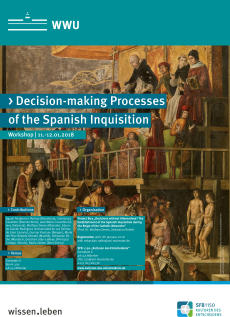Entscheidensprozesse in der Spanischen Inquisition

Mit Entscheidensprozessen in der Spanischen Inquisition befasst sich ein Workshop am SFB 1150 „Kulturen des Entscheidens“ am 11. und 12. Januar. Der Workshop mit dem Titel “Decision-making Processes of the Spanish Inquisition: Participants, Institutions, and Negotiations” wird organisiert von dem Teilprojekt B03 Entscheidung ohne Alternativen? Die Etablierung der Spanischen Inquisition während der Regierungszeit der Katholischen Könige (Prof. Dr. Wolfram Drews und Sebastian Rothe). Die Veranstaltung findet am Domplatz 6 im Raum 303 statt. Interessenten können sich bis zum 9. Januar bei sebastian.rothe@uni-muenster.de anmelden. Die Konferenzsprachen sind Englisch und Spanisch.
Unlike any other institution of the pre-modern period, the Spanish inquisition is commonly associated with political show trials and arbitrary rule. From this point of view, which goes back to 16th-century Protestant propaganda, the sentences pronounced would have been predetermined. However, revisionist attempts highlighting the rationality of the inquisitorial techniques seem to have adopted, unwillingly or not, the inquisitorial perspective: inquisitors made inquiries [Latin inquisitiones] in order to determine the truth about heretics who had chosen [Greek: haíresis/hairetízo] the wrong way.
The international and interdisciplinary workshop will question these narratives by considering inquisitorial decision-making from the perspective of cultural history, regarding it as a specific form of social interaction. In this respect, the inquisition’s founding period under the reign of the Catholic Monarchs is of special interest as we cannot only observe the activities of historical actors and institutions that participated in the inquisitorial proceedings, but also of those involved in establishing the inquisition and expanding its competences.
The workshop will deal with the following questions: which persons or social groups identified the need to establish an institution commissioned to decide about the orthodoxy of individuals, and which means did they employ to do so? Who denied that need? How did the inquisition create the need to extend its competences? What could be decided about in inquisitorial proceedings according to the contemporary perception? In which way were options generated, evaluated, and selected? What could the inquisitors decide about in the end?
The workshop will bring together international experts, medievalists as well as pre-modern and legal historians, in order to discuss this new approach of examining decision-making processes of the Spanish inquisition. The resulting interdisciplinary discussion will not only contribute to a better understanding of the Spanish inquisition’s founding period, it will also bring together different strands of research: scholars interested in the working of the inquisition itself and its legal framework, and those more interested in the history of groups persecuted by the inquisition, like specialists of converso, morisco or witchcraft studies.

